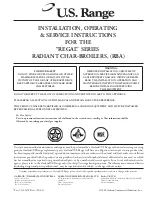
78
2.9
POSITIONING OF OUTLET
TERMINALS
The outlet terminals for forced draught
systems may be located on the outer walls
of the building.
Table 2
shows approximate,
non-binding minimum distances to be met
for a building of the type shown in fig. 11.
2.10
ELECTRICAL
WIRING
If you must replace the electric power
cable supplied with the boiler, order it exclu-
sively from Sime.
The power supply must be single-phase
230V - 50 Hz through a main switch protec-
ted by a fuse with a distance of at least 3
mm between contacts.
NOTE: The boiler must be connected with
an efficient grounding system.
SIME shall not be held liable for injury or
damage resulting from failure to ground
the boiler.
Fig. 11
TABLE 2
Siting of terminal
Appliances from 7 to 35 kW
(distances in mm)
A - below openable window
600
B - below ventilation opening
600
C - below eaves
300
D - below balcony (1)
300
E - from adjacent window
400
F - from adjacent ventilation opening
600
G - from horizontal or vertical soil or drain pipes (2)
300
H - from corner of building
300
I - from recess in building
300
L - from ground level or other treadable surface
2500
M - between two terminals set vertically
1500
N - between two terminals set horizontally
1000
O - from a surface facing without
openings or terminals
2000
P - as above but with openings and terminals
3000
1) Terminals below a practicable balcony must be located in such a way
that the total path of the smoke from its outlet point from the termi-
nal to its outlet point from the external perimeter of the balcony,
including the height of possible railings, is not less than 2000 mm.
2) When siting terminals, where materials that may be subject to
the action of the combustion products are present in the vicinity,
e.g., eaves, gutters and downspouts painted or made of plastic
material, projecting timberwork, etc., distances of not less than
1500 mm must be adopted, unless adequate shielding is provi-
ded to guard these materials.
















































